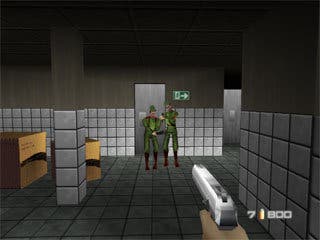Where does my money go?
When you spend £40 on a game, who gets it? Eurogamer investigates.
"Last year they put Modern Warfare 2 up by five or 10 dollars, saying, 'If you want it, you'll pay it.' And they did."
Payne says publishers could reduce the cost of games by slashing marketing spend - "the best marketing is your mate telling you it's the best game ever" - but Rod Cousens, CEO of Formula 1 creator Codemasters, won't budge. "Essentially, on that model, there's a real risk of losing money," he says. "You pay £12-20 million to create the game. Maybe more. It can be a high-risk business. It's not an equitable deal."
What of Sony, Microsoft and Nintendo, the companies that invest billions into the research and development, manufacturing and distribution of consoles? Could they reduce the amount they charge publishers to release games on their platforms?
"That wouldn't be for me to say," Payne says. "Work that one out for yourself."
Oliver is more blunt. "With the console manufacturers, there is no negotiation there. They're hardly going to allow you to negotiate on those costs of goods knowing if they negotiate once and they change the price once, they're always going to have changed the price."
There appears to be a stalemate, then, with the various players deadlocked as they stubbornly stick to established modes of thinking. But nothing lasts forever. Can, and indeed will, videogame prices go down?
It's a difficult question to answer. The industry is in a state of flux, with self-publishing and the digital space now almost as important as the sale of boxed games and bricks and mortar. The emergence of mobile devices such as iPhone and iPad as profitable game platforms has torn up the rulebook. And the problem the second-hand market poses demands an investigation all of its own. But we can speculate about the future of the 40 quid you hand over in exchange for videogames in shops - if indeed shops continue to exist.
"The whole market seems to be polarising," Livingstone says. "The triple-As, the real blockbusters, seem to be selling more. At the other end of the arc of sales there are niche titles that continue to sell well and budget titles will sell well. But the whole middle-ground seems to be challenged. That's where there will be a lot of price erosion. The middle ground will be compromised. Triple-A games will continue to command a premium price."

While it's likely that triple-A games will continue to demand a premium price, in truth games have never been cheaper. Who can forget £70 N64 games, the GoldenEyes and Lylat Wars of the cartridge era?
"As a box I'm not sure it changes other than you get margin erosion and you get lifecycle management through the history of the game," Cousens says. "Don't forget the cost of software has been pretty static for the last 15 years. Mortal Kombat on the N64 we put out at 70 quid when I was at Acclaim, and we didn't have any trouble selling the volume we did.
"Typically it's been £40-50, and yet the cost of development has probably gone up by a factor of five to 10. And you've got a fragmented hardware base to sell to now, so it's more challenging."
Today, supermarket price wars force the cost of videogames down to quite astonishing levels - even at launch.
"Argos or Tesco have said, 'Buy the latest blockbuster from us and it's cheaper,'" Oliver says. "They're making no money on it. It's a loss-leader to get footfall, and hopefully you'll buy other stuff while you're there."
A whopping 63 million console and PC games were bought in the UK last year. In 2010 the UK games market was worth £2.875 billion. It is a huge pie, but increasingly fragmented. These days savvy gamers shop around online for the best prices and specialists routinely slash the price of new videogames at launch while supermarkets undercut each other. There are some astonishingly good deals to be found out there. Gamers, even in these bitterly tough economic times, have never had it so good. But at what cost?
